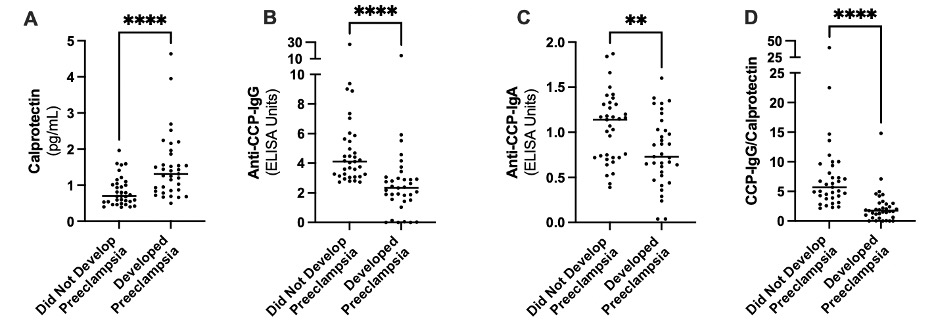Session Information
Date: Tuesday, October 28, 2025
Title: Abstracts: Reproductive Issues in Rheumatic Disorders (2627–2632)
Session Type: Abstract Session
Session Time: 3:15PM-3:30PM
Background/Purpose: Several systemic autoimmune diseases are associated with an increased risk of preeclampsia. Preeclampsia is a pregnancy complication characterized by new-onset hypertension after 20 weeks of gestation. Neutrophil extracellular trap (NET) formation is a process during which activated neutrophils externalize nuclear and cytoplasmic proteins in net-like structures. NETosis is increased in several systemic autoimmune diseases and has also been implicated in the pathogenesis of preeclampsia. Yet, there are limited data examining whether peripheral blood measures of NETosis can serve as predictive biomarkers for preeclampsia. In addition, autoantibodies to cyclic citrullinated peptide (anti-CCP) can target proteins externalized during NETosis, and preeclampsia is a risk factor for future development of rheumatoid arthritis (RA). In this study, we evaluated the relationship between preeclampsia, NETosis and anti-CCP antibodies in pregnant women without a history of autoimmune disease.
Methods: We included stored serum from Baby Blanket, a single-center, prospective pregnancy cohort (2011-2013) that collected maternal blood during pregnancy and obtained delivery outcomes by medical chart review. We included samples collected after 20 weeks gestation (median 33.4, IQR 27.0-35.5 weeks) in all women who later developed preeclampsia (Nf35) and in 35 controls matched on age, parity, and history of diabetes who did not develop preeclampsia. No women had an underlying history of RA or lupus. Serum was tested for calprotectin (Werfen), anti-CCP-IgG (CCP3, Werfen), and anti-CCP-IgA (CCP3.1 plate with research modification to detect IgA only). Calprotectin is an S100A8/A9 heterodimer released from neutrophils upon NET formation and can be used to quantify NETosis. Levels were compared between women who did vs. did not develop preeclampsia by Wilcoxon ranked sum test.
Results: Serum calprotectin levels were significantly higher in individuals who later developed preeclampsia compared to control pregnancies (p=0.008, Figure 1A). Paradoxically, serum anti-CCP-IgG and anti-CCP-IgA levels were significantly lower in individuals who later developed preeclampsia compared to controls (p< 0.001, Figure 1B-C). Notably, an anti-CCP-IgG/calprotectin ratio < 2 was 62.8% sensitive and 100% specific for developing preeclampsia.
Conclusion: Higher serum calprotectin and lower serum anti-CCP levels were strongly associated with increased risk of preeclampsia in women without autoimmune disease and may serve as novel clinical biomarkers for risk prediction. The finding that women who developed preeclampsia had lower anti-CCP levels and lower anti-CCP-IgG/calprotectin ratios suggests a potential protective effect of anti-CCP antibodies during pregnancy, perhaps buffering pathogenic effects of NET-associated proteins. While most anti-CCP levels in this study were not above the diagnostic level of positivity used in RA, low levels of anti-CCP antibodies can still be biologically relevant. Future studies are needed to determine whether anti-CCP could also be a predictive biomarker for preeclampsia in women with autoimmune diseases, particularly RA.
 Figure 1. Serum levels of Calprotectin and Anti-CCP in pregnant women. The figure depicts serum levels of calprotectin (A), anti-CCP-IgG (B), anti-CCP-IgA (C) and that ratio of anti-CCP-IgG/calprotectin in pregnant women after 20 weeks gestation who either did or did not later develop preeclampsia. P-values calculated by Wilcoxon ranked sum test.
Figure 1. Serum levels of Calprotectin and Anti-CCP in pregnant women. The figure depicts serum levels of calprotectin (A), anti-CCP-IgG (B), anti-CCP-IgA (C) and that ratio of anti-CCP-IgG/calprotectin in pregnant women after 20 weeks gestation who either did or did not later develop preeclampsia. P-values calculated by Wilcoxon ranked sum test.
To cite this abstract in AMA style:
Marcy D, Santoro N, Lugo C, Sturm K, Demoruelle K. Calprotectin and Anti-CCP Antibodies Predict Development of Preeclampsia [abstract]. Arthritis Rheumatol. 2025; 77 (suppl 9). https://acrabstracts.org/abstract/calprotectin-and-anti-ccp-antibodies-predict-development-of-preeclampsia/. Accessed .« Back to ACR Convergence 2025
ACR Meeting Abstracts - https://acrabstracts.org/abstract/calprotectin-and-anti-ccp-antibodies-predict-development-of-preeclampsia/
